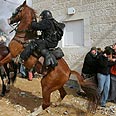
Knesset OKs Amona inquiry
Knesset members vote to set up parliamentary commission of inquiry into violent clashes during evacuation of illegal West Bank outpost that left hundreds wounded; decision taken by 37-32 margin
The decision will now be relayed to the Knesset Committee, which will determine the new commission's powers, scope, and duration of operation. Later, the proposal will be sent back to the Knesset for further approval.
The decision to establish the committee was taken by a 37-32 margin.
'An important accomplishment'
Following the decision, Knesset Member Daniel Benlolo (Likud), chairman of the Knesset's House Committee, told Ynet that he plans on convening the committee on Monday in order to determine the authorities of the inquiry commission.
"Israel's Knesset has spoken on the issue. The House Committee will do everything in order to set up a commission. I will not succumb to political pressures on the eve of the elections and we will do it with integrity and logic," Benlolo said.
Knesset Member Gideon Sa'ar, chairman of the Likud faction, said in response that the Knesset's decision was "an important accomplishment."
"Kadima was convinced that the Labor Party, along with Meretz and the Arab factions, would give them a majority, but we proved to them that their euphoria is exaggerated, and especially raised the principle that the Knesset can and should supervise the executive authority," Sa'ar said.
Yesha council pleased with decision
The Yesha Council welcomed the Knesset's decision, saying that "this is only the first stage, and we persist in our demand to set up a state inquiry committee."
"Ehud Olmert's refusal to bring the issue for a cabinet voting testifies to his great fear of the conclusions of such a committee," a Yesha Council official said.
Pinchas Wallerstein, head of the Binyamin Regional Council, said that "I am very pleased that Knesset of Israel understood that the only way to maintain life in the Israeli society is to accept Yesha Council's demand and investigate to the fullest extent the army and police's behavior, and especially their senders."
"We are also ready to be interrogated, hoping that whoever did this will be punished for it," he said.
The debate was also attended by Nachi Ariel, whose son Yechiam sustained serious head wounds while resisting the evacuation in Amona.
The father recounted the story and told those present: "Had medical treatment not been provided at the scene, you would be coming to comfort me as I mourn."
Minister Boim: Decision infected with cheap politics
Some officials, however, blasted the Knesset's decision, including Housing Minister Zeev Boim (Kadima), who said that "the decision to set up a parliamentary inquiry commission is infected with cheap politics on the eve of the elections."
"It's a shame that the security forces are the victims of political survival desires of the Right and the Left," he said.
Peace Now Secretary-General Yariv Oppenheimer said that "the decision to set up an inquiry commission is another decision to be ashamed of the 16th Knesset with its current members."
"Instead of interrogating the heads of the Yesha Council, who coarsely breached the law for years, the Knesset decides to blame the police and those who are trying to impose a little order in the territories," he said.
Police: Settlers' violence unprecedented
Earlier Wednesday, the Knesset Interior Committee held a discussion on the violence in Amona. During the session, Judea and Samaria District Police Commander Yisrael Yitzhaki said that despite the many complaints voiced by settlers, up until now only three complaints were filed against police officers on suspicion of beating up settlers during the evacuation.
"We had intelligence regarding preparations for numerous disruptions of order," Yitzhaki said. "Thousands of cinder blocks and tires do not make it to roofs unless they were prepared in advance. The settlers wanted to show police they came for a confrontation and wanted to prove they're not as 'weak' as the Gush Katif evacuees."
Yitzhaki noted that during the clashes in Amona, his troops were forced to face unprecedented phenomena.
"In the last 19 years I witnessed significant disruptions of order, but I've never seen the scope of riots we saw at Amona," he said. "People thought the Israel Police will fail in carrying out a law enforcement mission."
"We set up a team that interprets videos we shot and dozens of people have already been identified as stone throwers. We'll arrest those people, who will pay for what they did," he said.
'MKs incited civilians'
Deputy Police Chief Benny Kaniak, who also attended the discussion, added: "There's no other police and when we need to enforce the law, we do it with the necessary caution."
"Police acted professionally during this incident," he said. "We didn't use force where force wasn't used against us. However, severe violence was used against us. Our basic worldview was minimum friction and police officers arrived with protection gear so that they can display higher levels of restraint."
"We didn't want to hit or wound anyone," Kaniak added. "We prepared police officers mentally. Charges that what we did is akin to war crimes and similar statements are improper."
Kaniak noted he regretted the wounds sustained by Knesset Members Effie Eitam and Arieh Eldad during the clashes, but said images of the event speak for themselves.
"To some extent, the Knesset members incited civilians," he charged.










